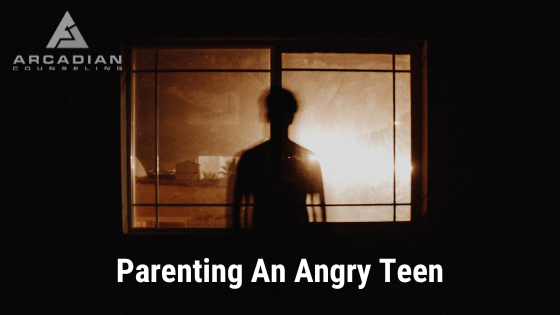Raising a teenager can be one of the most challenging experiences a parent will go through. But parenting an angry teen can take things to a whole new level. Teenagers are in an awkward transitional stage. They’re dealing with hormonal changes that are out of their control and a brain that is still developing. They’re awakening to new realizations about themselves and the world around them. Teenage rebellion is a natural phase, however, handling it as a parent is anything but natural. If you’re struggling with parenting an angry teen, here are some strategies that might help.
Strategies For Parenting An Angry Teen
1. Keep Your Cool

Getting angry at your teen for being angry is about as helpful as sticking a fork in your eye when you’ve got something stuck in it. While easier said than done, you need to keep your cool when parenting an angry teen.
It may be difficult to keep your cool when your teen is yelling at you, but as the adult, it’s important that you maintain control. Refrain from yelling, swearing, or name-calling your teen. (This should go without saying across the board when it comes to parenting – especially the last two).
Verbal abuse only escalates arguments and typically creates negative long-term impact on your child and your relationship. If your teen is being verbally abusive, apply consequences to their behavior and speak in a calm, matter-of-fact tone.
2. Accountability, Not Control

Parenting an angry teen requires clear, assertive communication with boundaries and consequences to inappropriate behavior.
Rather than trying to control your teen and their behavior (which you can’t do), make them accountable. Set clear boundaries, and establish rules and consequences for inappropriate behavior. Most importantly, stick to your guns. Failing to maintain boundaries and enforcing consequences will only make things worse in the long run and it sets a poor example for teen.
3. Listen

Parenting an angry teen requires the ability to listen with the intent to understand, not respond. Do this effectively and you will be well on your way to improving your relationship with your teen.
Let’s face it, it can be difficult to listen when your child is yelling or angry. Your natural reaction will likely be to defend or criticize. This is wrong and never works. Ask yourself this: How do you feel when someone becomes defensive and criticizes you?
Rather than offering advice or judgment, actively listen to your teen. This means staying silent while they talk, and asking questions to better understand how they’re feeling. It also means clarifying what you are hearing to be sure you actually are understanding them. Calmly express that it’s difficult to listen to them when they’re angry and yelling. By genuinely trying to listen and understand them, you can teach them how to control their emotions and express themselves calmly.
4. Give Them Space

Sometimes we all need a little bit of space and time to regain center and get some perspective. Teens are no different. If you’re parenting an angry teen it may be tempting to hover, but don’t. You’ll likely only make things worse.
When your teen is angry and wants to storm off, let them go instead of following them and trying to continue or resolve the argument. It’s healthy for both of you to give each other space and time to cool off so you can revisit the discussion when you’re both feeling calmer.
5. Pick Your Battles

Learning how to pick your battles when parenting an angry teen is a critical skill you need to master.
Your teen is going through a difficult phase, and needs empathy. Remember when you were a teen? It sucked right? It felt like no one understood or cared. Empathizing with your teen and their situation is critical. There will be times when they seem to be making a huge deal out of seemingly nothing. As the parent, it’s your job to know when to stand your ground, and when to let things go. Work with your spouse or partner to come up with a plan of action to set boundaries and determine priorities or issues that can be compromised, and issues that are non-negotiable.
Life is short, parenting is hard. If you’re struggling with parenting an angry teen find an awesome therapist you like and trust to help you figure out how to empathize, listen and best support them. Probably not the worst idea to have a support system for yourself. ????
James Killian, LPC is the Principal Therapist & Owner of Arcadian Counseling in Greater New Haven, CT where they specialize in helping over-thinkers, high achievers, and perfectionists reduce stress, increase fulfillment and enhance performance so they can move From Surviving To Thriving.

